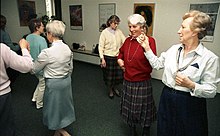Senior
Senior refers to a person older than life, for example retired or retired . Also, an elder in a circle, quorum, or the like is referred to as a senior . As a social group, seniors are relevant, among other things, as a target group for marketing , which is covered by keywords such as best agers . At the municipal level, senior citizens are represented in the pre-parliamentary room by senior citizens 'representatives, a generic term for senior citizens' councils, senior citizens 'advisory councils, senior citizens' representatives. As a link between politics, administration and the elderly, they enable and secure the participation of older people in social activities.
Concept history
The term senior , from the Latin senior “older” , originally had a subject-specific meaning, meant the “older” in a family association (as opposed to the junior ), the “eldest” of a church community or the so-called “old men” of student corporations . Older German-language dictionaries define senior exclusively in this specific meaning. As a name affix , senior appears after the name and then mostly abbreviated as "sen." To distinguish older from younger relatives of the same name. In German and British English ("Snr") the addition is not separated by a comma, in American English ("Sr.") a comma can be used.
The term senior was adopted as early as the 14th century from the Latin senior for older, eldest, old master, father (in relation to the son), older or old person and referred to as an antithesis to junior an adult, mature man from about 45 to 60 years . It is a comparative to the Latin senex (Gen. senis, senicis) 'old, aged, which in turn was substantiated for the old, old man , man over 60 years' (cf. Seneschall ). Since the 18th century, senior became common for the 'head (of the family), old master', and in merchant language also for 'older partner, business partner'. In leisure and competitive sports, an "older athlete" who has outgrown youth is now referred to as a senior.
In the 1970s, the term experienced a semantic shift and became the general designation for members of the “old” age . The FRG seems to have preceded this change in meaning in the German-speaking area , whereas the Leipzig Duden from 1967, which represents linguistic usage in the GDR , still records the traditional definition. The change in meaning, a so-called “expansion of meaning” according to the categories of semantics, has a euphemistic background. “Senior”, mostly used in the plural form “Seniors”, is intended to replace and upgrade the largely negative term “ old ”.
The term corresponds to the prevailing understanding of older people in the modern leisure society , which is characterized by consumer orientation and marketing . Terminological renaming (“Seniorenheim” or “Seniorenresidenz” instead of “Seniorenheim”) or linguistic neologisms (“Seniorenreisen”, “Senioreneller”, “ Seniorentreff ”) go in the same direction.
Web links
Individual evidence
- ↑ online at Duden.de
- ↑ Jan Winkler: Consumption Behavior of Seniors. Pp. 5-9, Diplomica Verlag 2008, online here
- ↑ Information and database of senior representatives in Germany
- ↑ BR Pekruhn: The German word. Leipzig 1934, p. 904.
- ↑ Christian Stang, Anja Steinhauer: Comma, period and all other punctuation marks: The new rules of punctuation with an extensive collection of examples. Duden 2007, ISBN 978-3-411-90113-5 , p. 61 (§ 69).
- ^ Etymological Dictionary of German (after Pfeifer), here online in the Digital Dictionary of the German Language of the 20th Century
- ↑ Large Brockhaus from 1980: "older people, pensioners"
- ↑ Duden: Universal dictionary from 2002, 4th edition: older people, people in retirement age, retirees
- ↑ Duden, Leipzig, p. 430.
